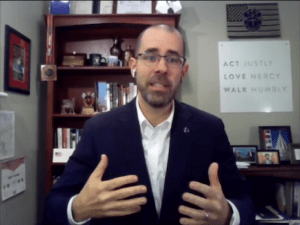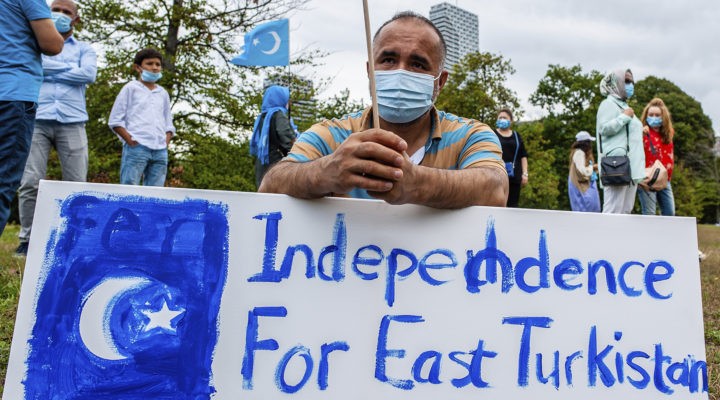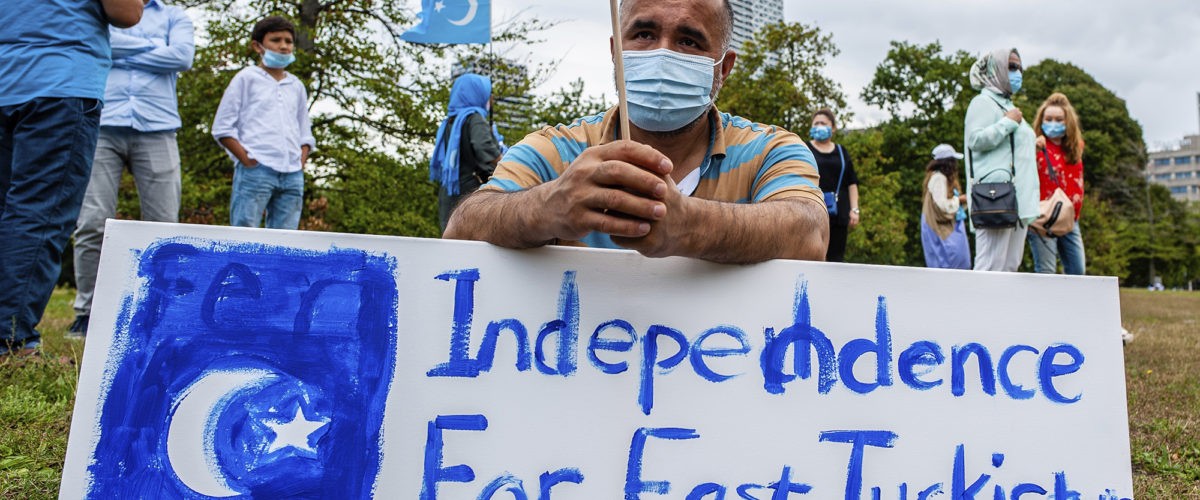Government restrictions on in-person church gatherings during the COVID-19 pandemic have been inconvenient, disruptive and possibly even illegal in some instances, but they are not examples of religious persecution as some American faith leaders have claimed, an expert on global human rights and religious freedom said during a Jan. 25 webinar hosted by Baptist News Global.
One need only look at the oppression of religious minorities around the world to see that domestic limits on worship size or efforts to temporarily ban gatherings out of concern for health and safety have nothing in common with actual repression, said Knox Thames, who serves as a fellow at the Institute for Global Engagement.

Knox Thames at the BNG webinar Jan. 25, 2021.
The comparison just doesn’t hold up, he said. “A bad day in the United States is better than just about any other country in the world when it comes to religious freedom,” said Thames, who previously served as a special adviser on religious minorities and human rights for the U.S. State Department under the Obama and Trump administrations.
Webinar moderator Mark Wingfield, executive editor and publisher of BNG, led Thames through a series of questions covering topics from global human rights and religious oppression to the ways concerned people of faith in the United States can better love their neighbors, both locally and globally.
Thames was asked about the influences that inspired him to pursue a career championing international religious rights. The Kentucky native, a graduate of Georgetown College, gave much of the credit to his Baptist parents for instilling in him a desire to give back.
“As teachers, both of them were focused on Eastern Kentucky and Appalachia, where there is a need for good schools and an encouragement for kids to finish,” he explained.
His local faith community imbued in him a drive to serve others, as well. “My church home growing up, First Baptist of Richmond, was a very missions-oriented church. We did a lot of mission trips around the state and around the region, everything from VBS to the Meals on Wheels-type examples of charity.”
Together with inspiring professors at Georgetown College, these influences propelled him to a stint working with AmeriCorps to serve refugees resettled in the United States. It was there he began to meet people who had suffered terribly for their ethnicity or religion and developed a deeper appreciation for the nation’s role as a safe haven for those who have suffered horrific, cruel treatment.
He also met his future wife in AmeriCorps, he added. “Human rights work can be romantic, I like to say.”
He went on to serve with the U.S. Commission on Security and Cooperation in Europe, with the U.S. Commission on International Religious Freedom and as special adviser for religious minorities in the Near East and South and Central Asia for the State Department.
And he continues to write extensively on these issues. To mark Human Rights Day, Thames penned an opinion piece for BNG in which he called Christians to rise and meet the challenges posed by “a pandemic of persecution” affecting billions of people across the globe.
“Our belief in human dignity — the Imago Dei — means we cannot be silent. Because of human dignity, we should advocate for persecuted Christians, as well as Muslims, Hindus, atheists or whoever suffers for their beliefs,” he wrote.
Helping the persecuted also means knowing what persecution is and isn’t.
But helping the persecuted also means knowing what persecution is and isn’t. Wingfield asked if saying “happy holidays” instead of “merry Christmas” is a slippery slope toward persecution as some U.S. Christians have claimed.
But Thames wasn’t having it. “We have such religious freedom here.”
And there is another missing ingredient in the U.S.: systematic, often government-supported violence against minority religious groups, he said. “The key element in understanding if something is persecution: Is violence involved? Either violence from the state or violence from an independent actor? … It needs to be violent. It needs to be targeted. It’s often life and death.”
And to be persecution, the violence must be specifically targeted, usually at a minority group, he added. “This isn’t carpet bombing. It’s, ‘We are going to make you pay and scare you,’ I have seen places where commandos raid a church and take everyone to jail.”
The United States stands in stark contrast to nations where those conditions exist, he said. It remains among the most open and liberal toward freedom of faith and religious practice. Claiming otherwise can be dangerous.
“If you call everything persecution, then nothing is persecution.”
“It’s important that we as Christians, or anyone who wants to advocate for the repressed, that we’re very careful about our terminology. If you call everything persecution, then nothing is persecution,” said Thames, author of an October Christianity Today article titled “Coronavirus Church Closures Are Not Persecution.”
Wingfield asked about global hotspots for religious persecution. Thames cited a November 2020 Pew Research Center study that found two-thirds of the world’s population lives under some form of restrictions to religious belief and practice.
“The global scene is bad, and it is overwhelming,” he said, citing China’s genocidal persecution of Uyghur Muslims, Myanmar’s attacks on Rohingya Muslims and various Christian groups, and the plight of converts to Christianity who face imprisonment and death from governments like Pakistan. Atheists and agnostics also are suffering greatly in many countries.
Thames praised the Trump administration for doing more to promote global religious freedom than any before it. Two summits were convened to aggressively pursue alliances with other nations to decrease attacks on human rights and religious minorities. The effort was led by Sam Brownback, U.S. ambassador on religious freedom.
“I have to give him a lot of credit. He did this the right way, focusing on religious freedom for everybody. Of course, if Christians are persecuted, we wanted to talk about that, and we did. But also, when Muslims are persecuted, or Hindus or people who don’t hold a certain belief, we spoke out for them as well.”
That period demonstrated how much the United States can do to advance religious freedoms, but also showcased the nation’s limits, he said. “It’s going to take conversations like this (webinar) — how do we get the average person to support religious freedom for the Other? Of course, you want it for you and yours, but you also want it for the Other, as well. I think that’s the next frontier for this work.”
The Sudan, which is Muslim led, has removed the death penalty as a punishment for blasphemy and apostacy.
However, Thames also cited some positive news. The Sudan, which is Muslim led, has removed the death penalty as a punishment for blasphemy and apostasy. Uzbekistan, meanwhile, is in the midst of instituting legal reforms for religion and belief in the historically authoritarian nation.
Wingfield asked if government actions, like a recent U.S. House and Senate resolution calling for an end to blasphemy and heresy laws globally, actually make a difference.
Probably not in the case of countries like Pakistan, which has three times as many people incarcerated due to blasphemy than all other nations combined. “Pakistan is the worst of the worst on blasphemy,” Thames said. “It doesn’t care what our Congress did.
“At the same time, I think any time our legislators speak to these issues in a united way, in a concerted way, it’s a good thing because countries do notice and it’s also an important tool to educate Congress about events outside the United States.”
Thames was then asked: What can people of faith do to promote the cause of religious freedom?
“Pray,” he answered. “That is the best answer. … Ask God to get engaged in the world and to use us his people to make the world a better place. And hopefully through that he will open our eyes to see other ways to engage.”
Another way is to support organizations that advocate for the right of conscience, religious belief and practice around the world, he suggested, noting it’s also important for citizens to engage members of Congress, who are able to engage with governments that persecute religious minorities.
“That will keep you busy if you are focused on those three things,” he said.
Wingfield asked Thames what advice he would offer the Biden administration on issues of human rights and religious freedom.
“If human rights matter, then we need to act like they matter.”
“If human rights matter, then we need to act like they matter,” he said, adding that he echoed that sentiment in a Jan. 19 article in the Harvard Human Rights Journal.
The U.S. cannot claim to support persecuted people in some countries but ignore arrests and executions in Egypt, the execution of a journalist in Saudi Arabia or the persecution of Christians and Muslims in India, which has turned to Hindu extremism, he said.
“If human rights matter, then my advice is we have to have consequences for abuses. I think China shows what happens when there is that gap, when there is a policy of all carrots and no sticks.”
All too often, these issues are ignored or mishandled out of political or economic expedience, Thames added. “I have seen it so many times in my career: the tyranny of the urgent driving policies we know are going to have a negative effect in five or 10 years. … We mortgage the future to solve a problem now.”


